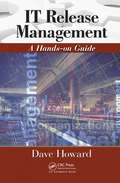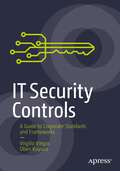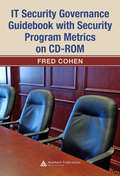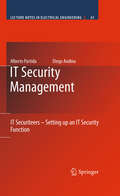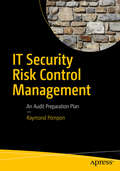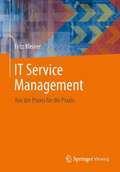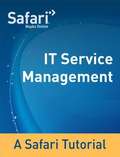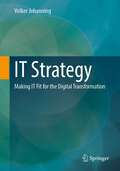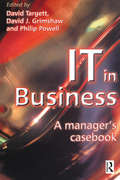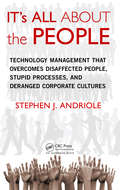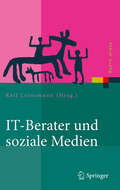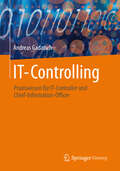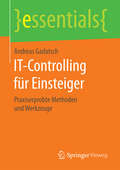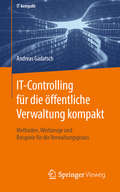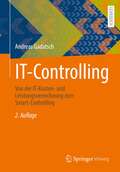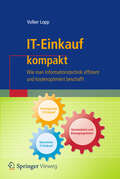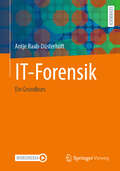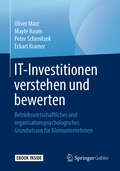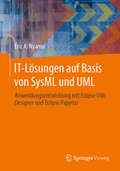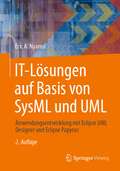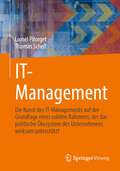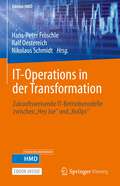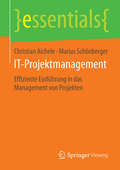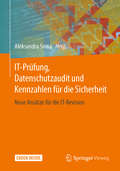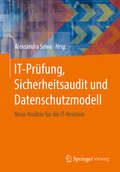- Table View
- List View
IT Release Management: A Hands-on Guide
by Dave HowardWhen implemented correctly, release management can help ensure that quality is integrated throughout the development, implementation, and delivery of services, applications, and infrastructure. This holistic, total cost of ownership approach allows for higher levels of system availability, is more cost effective to maintain, and increases overall s
IT Security Controls: A Guide to Corporate Standards and Frameworks
by Virgilio Viegas Oben KuyucuUse this reference for IT security practitioners to get an overview of the major standards and frameworks, and a proposed architecture to meet them. The book identifies and describes the necessary controls and processes that must be implemented in order to secure your organization's infrastructure.The book proposes a comprehensive approach to the implementation of IT security controls with an easily understandable graphic implementation proposal to comply with the most relevant market standards (ISO 27001, NIST, PCI-DSS, and COBIT) and a significant number of regulatory frameworks from central banks across the World (European Union, Switzerland, UK, Singapore, Hong Kong, India, Qatar, Kuwait, Saudi Arabia, Oman, etc.). To connect the book with the real world, a number of well-known case studies are featured to explain what went wrong with the biggest hacks of the decade, and which controls should have been in place to prevent them. The book also describes a set of well-known security tools available to support you.What You Will LearnUnderstand corporate IT security controls, including governance, policies, procedures, and security awarenessKnow cybersecurity and risk assessment techniques such as penetration testing, red teaming, compliance scans, firewall assurance, and vulnerability scansUnderstand technical IT security controls for unmanaged and managed devices, and perimeter controlsImplement security testing tools such as steganography, vulnerability scanners, session hijacking, intrusion detection, and more Who This Book Is For IT security managers, chief information security officers, information security practitioners, and IT auditors will use the book as a reference and support guide to conduct gap analyses and audits of their organizations’ IT security controls implementations.
IT Security Governance Guidebook with Security Program Metrics on CD-ROM (The CISO Toolkit)
by Fred CohenThe IT Security Governance Guidebook with Security Program Metrics provides clear and concise explanations of key issues in information protection, describing the basic structure of information protection and enterprise protection programs. Including graphics to support the information in the text, this book includes both an overview of material as well as detailed explanations of specific issues. The accompanying downloadable resources offers a collection of metrics, formed from repeatable and comparable measurement, that are designed to correspond to the enterprise security governance model provided in the text, allowing an enterprise to measure its overall information protection program.
IT Security Management
by Alberto Partida Diego AndinaIT securiteers - The human and technical dimension working for the organisation. Current corporate governance regulations and international standards lead many organisations, big and small, to the creation of an information technology (IT) security function in their organisational chart or to the acquisition of services from the IT security industry. More often than desired, these teams are only useful for companies' executives to tick the corresponding box in a certification process, be it ISO, ITIL, PCI, etc. Many IT security teams do not provide business value to their company. They fail to really protect the organisation from the increasing number of threats targeting its information systems. IT Security Management provides an insight into how to create and grow a team of passionate IT security professionals. We will call them "securiteers". They will add value to the business, improving the information security stance of organisations.
IT Security Risk Control Management
by Raymond PomponInformation security is more than configuring firewalls, removing viruses, hacking machines, or setting passwords. Creating and promoting a successful security program requires skills in organizational consulting, diplomacy, change management, risk analysis, and out-of-the-box thinking. IT Security Risk Control Management provides step-by-step guidance for IT professionals on how to craft a successful security program. You will identify with the paradoxes of information security and discover handy tools that hook security controls into business processes. What You Will Learn: Build a security program that will fit neatly into an organization and change dynamically to suit both the needs of the organization and survive constantly changing threats Prepare for and pass such common audits as PCI-DSS, SSAE-16, and ISO 27001 Calibrate the scope, and customize security controls to fit into an organization's culture Implement the most challenging processes, pointing out common pitfalls and distractions Frame security and risk issues to be clear and actionable so that decision makers, technical personnel, and users will listen and value your advice Who This Book Is For: IT professionals moving into the security field; new security managers, directors, project heads, and would-be CISOs; and security specialists from other disciplines moving into information security (e. g. , former military security professionals, law enforcement professionals, and physical security professionals)
IT Service Management
by Fritz KleinerEin erfolgreich eingeführtes und gelebtes IT Service Management ist für eine Unternehmung ein essentieller Faktor. Eine schlechte Verfügbarkeit, große Ausfälle von wichtigen Informatik-Komponenten/Services oder eine zu teure Informatik können den Unternehmenserfolg massiv beeinträchtigen. Meistens werden in solchen Fällen teure Informatik-Berater eingekauft, welche dem Unternehmen helfen, das IT Service Management inkl. der IT Kosten zu optimieren. Fritz Kleiner zeigt basierend auf seinem grossen Erfahrungsschatz als Senior Consultant und Principal mit vielen Praxisbeispielen auf, wie IT Service Management ganzheitlich in einer Unternehmung eingeführt und betrieben werden kann. Mit diesem Buch wird der Leser befähigt, das IT Service Management-Konzept zu verstehen und weitgehend selbständig erfolgreich im Unternehmen zu etablieren.
IT Service Management Tutorial
by Safari Content TeamThis is a guide to IT Service Management (ITSM) using the IT Infrastructure Library (ITIL) approach. It is aimed at both technical and non-technical IT management professionals and contains a combination of management, procedural and technical information on implementing ITSM. Upon completion of this tutorial, and by accessing the resources in Safari Books Online, you will have an understanding of the core elements and components of ITSM. This includes the different facets of incident, problem, change and knowledge management, combined with practical details on the metrics and measurement of ITSM methods described, and enhanced with practical guidance on how to use these methodologies in practical settings.
IT Strategy: Making IT Fit for the Digital Transformation
by Volker JohanningCreate an IT strategy for your company with this book.In seven consecutive steps, this book presents the development of an IT strategy for manufacturing companies with the possibility of practical implementation using ready-made worksheets. It looks at all the issues relevant to an IT strategy, from deriving the IT strategy from the corporate strategy to creating the application and sourcing strategy. The role of IT in the company and the role of the CIO are examined in detail, and the demand/supply model is presented in detail as a structural organisation. In this book, the reader learns how to transfer the IT strategy into a roadmap for implementation, how to use a portfolio to control the projects and how to implement and control the goals of the IT strategy with a specially developed IT strategy cockpit. The second edition takes greater account of digitalisationThis second edition focuses on manufacturing companies in order to take into account the industry focus of any IT strategy. It also considers the distinction from digitalisation and digitalisation strategies and contains additional explanations on agile methods, DevOps as well as bi-modal IT structures. As a result, the existing 7-step concept for developing an IT strategy has become more focused and has taken on the current issues of IT and digitalisation, which continue to develop at a rapid pace.In terms of content, the book on creating IT strategies focuses on the following areas:- Fundamentals of IT strategy as well as differentiation from a digitalisation strategy.- Reasons for an IT strategy- As-is analysis of IT- Analysis of the corporate strategy- IT application strategy- Sourcing strategy- IT organisation and IT governance- Practical implementation: budgeting, IT roadmap and IT project portfolio- Monitoring and control of the IT strategy with the IT strategy cockpit The author primarily addresses CIOs and IT managers of medium-sized to large companies and groups in the manufacturing industry. In addition, the book is suitable for the following target groups:- IT staff, IT controlling and IT management level employees.- IT management consultants- CFOs, CEOs, managing directors and board members of manufacturing companies
IT in Business: A Manager's Casebook
by D. Targett David Grimshaw Philip Powell'IT in Business: A Manager's Casebook' examines the impact of new IT initiatives from the business angle. The case material is derived from the year's best research projects from three leading UK Business Schools - Bath, Cranfield and Warwick. This incisive exploration of managing processes in IT companies is essential reading for IT managers in 'end-user' businesses who have to deliver strong business benefits from IT. In a climate of rapid and continual change, such contemporary information is invaluable.'IT in Business: A Manager's Casebook' tackles managerial issues using specific case studies such as Tesco, Johnsons News Limited and the Department of Health to illustrate these points.David Targett is the Professor of Information Management at Imperial College Management School, University of London. For eight years, 1990-98, he was the Professor of Information Systems and Director of the Centre for Research into Strategic Information Systems (CRSIS) at the University of Bath. Previously, he was at the London Business School and before becoming an academic he was an industrial engineer in the motor industry.David Grimshaw is Senior Lecturer in Information Systems at Cranfield School of Management and was previously at the University of Leeds and Warwick Business School, University of Warwick. He has wide teaching experience and has taught in Australia, Hong Kong, Malaysia, Portugal, Russia and Singapore. He has ten years' practical experience in information systems and as an independent consultant has advised many companies on strategic information systems planning and on geographical information systems.Philip Powell is Professor of Information Systems at Goldsmiths College, University of London. Prior to this he was Reader in Information Systems and ICAEW Academic Fellow in the Operational Research and Systems Group, and Director of the Information Systems Research Unit at Warwick Business School. Before becoming an academic he worked in insurance, accounting and computing. He has taught in Southampton, Australia and Portugal and held a number of other posts overseas.
IT's All about the People: Technology Management That Overcomes Disaffected People, Stupid Processes, and Deranged Corporate Cultures
by Stephen J. AndrioleThis book explains how to achieve dramatic improvements in service and agility by enhancing the people, processes, and culture within your organization. It details the various roles within the technology management process and supplies insight into the realities of human behavior-including the range of best and worst behaviors from managers, executives, and corporate culture. Industry veteran Stephen J. Andriole provides a fresh perspective on the old basics of IT management through a twenty-first-century lens.
IT-Berater und soziale Medien
by Ralf LeinemannIT-Produkte sind häufig sehr komplex. Daher spielen Berater bei Kaufentscheidungen eine wichtige Rolle. In dem Band setzen sich die Autoren mit dieser Situation auseinander und befassen sich mit ihren Auswirkungen auf Kommunikationsabteilungen von Unternehmen. Sie gehen auch auf die wachsende Bedeutung von Social Media und den damit einhergehenden Veränderungen der Beraterlandschaft ein. Zudem werden regionale Besonderheiten bzw. die Situation in Deutschland im internationalen Kontext betrachtet.
IT-Controlling
by Andreas GadatschViele Unternehmen planen dem zunehmenden Kosten- und Leistungsdruck in der IT etwas entgegenzusetzen. Das IT-Controlling-Konzept liefert hierzu die passenden Methoden. Das Buch erklärt in kompakter Form, welche strategischen und operativen Instrumente für den IT-Controller entwickelt wurden und wie sie in der Praxis eingesetzt werden können. Der Buchmarkt für das Spezialgebiet IT-Controlling ist begrenzt. Die Bücher des Autoren "Gadatsch" gelten als Standardwerke. Das kompakte Buch "IT-Controlling realisieren" ergänzt das vom Autor mit herausgegebene Lehrbuch "Masterkurs IT-Controlling", das sich an Studierende und Wissenschaftler richtet. Es verzichtet weitgehend auf theoretische Ableitungen und "zeigt wie es geht".
IT-Controlling für Einsteiger: Praxiserprobte Methoden und Werkzeuge (essentials)
by Andreas GadatschAndreas Gadatsch beschreibt, was IT-Controlling konkret ist und wie man es nutzen kann. Hierzu erklärt der Autor die zentralen Aspekte und stellt praxistaugliche Methoden anhand von Beispielen vor. Erleichtern Sie sich die tägliche Praxis im IT-Management! Nach der Lektüre dieses essentials können Sie u. a. mit Hilfe der IT-Balanced Scorecard IT-Strategien umsetzen und steuern oder mit Hilfe des Portfoliomanagements Projektbündel zusammenstellen und überwachen. Die Earned-Value-Analyse hilft Ihnen bei der Projektplanung und deren Überwachung. Mit Hilfe der IT-Kosten- und Leistungsrechnung und IT-Kennzahlen liefern Sie die Basis für rationale Entscheidungen und ein zielorientiertes Reporting. Wer mehr wissen möchte, findet hier auch geeignete Hinweise auf weitere Literatur und aktuelle Studien.
IT-Controlling für die öffentliche Verwaltung kompakt: Methoden, Werkzeuge und Beispiele für die Verwaltungspraxis (IT kompakt)
by Andreas GadatschAndreas Gadatsch zeigt konkret auf, was IT-Controlling ist und wie man es in der öffentlichen Verwaltung nutzen kann. Hierzu werden die zentralen Aspekte erklärt und praxistaugliche Methoden anhand von Beispielen mit Bezug auf den öffentlichen Sektor vorgestellt.
IT-Controlling: Von der IT-Kosten- und Leistungsverrechnung zum Smart-Controlling
by Andreas GadatschIT-Controlling ist als Instrument zur Steuerung der Informationstechnik etabliert. Das Berufsbild des IT-Controllers bzw. der IT-Controllerin hat sich über längere Zeit nur moderat verändert. Es wurde vor allem mit IT-Budgetierung, IT-Portfoliomanagement, IT-Kostenplanung, -Verrechnung und -kontrolle in Verbindung gebracht. Durch die Digitalisierung ist jedoch Bewegung in Ziele, Inhalte und Methoden gekommen. Neue Themen wie Steuerung der Digitalstrategie, Cloud-Controlling, Data Science u. a. sind in der Diskussion. Das Aufgabenprofil wandelt sich weg von der reinen IT-Kostenanalyse, hin zum Management der Digitalisierungsstrategie mit einem Fokus auf strategisches IT-Portfoliomanagement. Einige Stimmen sprechen bereits vom „Smart-Controlling“ oder „Digital-Controlling“. Das Buch stellt ein IT-Controlling-Konzept für das Digitale Zeitalter vor und erläutert die relevanten Methoden in praxisnaher Form.
IT-Einkauf kompakt: Wie Man Informationstechnik Effizient Und Kostenoptimiert Beschafft (It Kompakt Ser.)
by Volker LoppIn Zeiten der Digitalisierung, in denen große Datenmengen schnell und effizient verarbeitet werden müssen, steht das IT-Management oft vor einer großen Herausforderung. Um die Kosten gering und effizient zu halten, empfiehlt es sich, bei den Basics anzusetzen. Viele Unternehmen unterschätzen immer noch das Potential eines professionellen und standardisierten IT-Einkaufs. Jedes Unternehmen kann davon enorm profitieren, ganz gleich, ob sie nur im Einzelfall ein größeres Projekt strukturierter angehen wollen oder aber umfangreiche oder ungewöhnliche viele Ausschreibungen zu bewältigen haben. Ein grundsätzliches Überprüfen der bisherigen Verfahren ist immer dann ratsam, wenn die Prozesse verbessert oder die Beschaffungsstrategie überarbeitet werden sollen, wenn die externen Kosten gesenkt werden müssen oder aber ein Unternehmen die Qualität seiner IT-Beratungen und damit das Firmenimage verbessern möchte.Dieses Buch für den IT-Einkauf geht detailliert auf die speziellen Anforderungen für die Beschaffung von Hardware, Software, Dienstleistungen und Cloud-Services ein. Der Autor fasst die wichtigsten Gründe, aus denen ein IT-Einkauf benötigt wird, kompakt zusammen und zeigt, wie sich der IT-Markt aus Sicht des Einkäufers gestaltet. Neben einem ausführlichen Überblick über die Zusammenarbeit mit der IT-Abteilung und der besonderen Bedeutung des Lieferantenmanagements bei den großen Abhängigkeiten in der Informationstechnologie, erläutert der Autor die Wichtigkeit der Stammdaten und wie man ihre Qualität erhöhen kann. Ein Exkurs über das Vertrags- und Lizenzmanagement rundet dieses kompakte Buch ab.Damit ist es der ideale Ratgeber für Einkaufsleiter, IT-Leiter, IT-Einkäufer und die Konzernrevision, da es vom Hard- und Software-Einkauf, über das Mangement von Verträgen, Lizenzen und Lieferanten bis hin zu den eigentliche IT-Ausschreibungen alle wesentlichen Themengebiete des strategischen Einkaufs abdeckt.
IT-Forensik: Ein Grundkurs
by Antje Raab-DüsterhöftDie IT-Forensik hat zum Ziel, Cybercrime-Vorfälle wie z.B. Hacker-Angriffe, Phishing-Attacken oder einen Daten-Diebstahl aufzuklären. Dazu werden digitale Spuren, die Täter in IT-Systemen hinterlassen haben, erfasst und ausgewertet. IT-Forensik hilft, die Schwachstellen von IT-Systemen zu erkennen und die Sicherheit der IT-Systeme zu erhöhen.
IT-Investitionen verstehen und bewerten: Betriebswirtschaftliches und organisationspsychologisches Grundwissen für Kleinunternehmen
by Oliver Marz Mayte Baum Peter Schimitzek Eckart KramerDieses Buch richtet sich an Klein- und Kleinstunternehmen, die die Einführung eines Warenwirtschafts- oder Enterprise-Resource-Planning-Systems planen und ihre Prozesse erfolgreich digitalisieren wollen. Es bietet Unterstützung bei der Erstellung einer wirtschaftlichen Bewertung, um den Nutzenbeitrag der Investition deutlich und selbstständig herausstellen zu können. Neben den wirtschaftlichen Grundlagen bietet das Buch Einblicke in die organisatorischen und psychologischen Herausforderungen, die den Prozess der Einführung und Nutzung begleiten. Zudem werden vor allem motivationspsychologische Grundlagen betrachtet, die gleichermaßen die Geschäftsführung und Mitarbeiter betreffen.
IT-Lösungen auf Basis von SysML und UML: Anwendungsentwicklung mit Eclipse UML Designer und Eclipse Papyrus
by Eric A. NyamsiDas Buch fokussiert auf Eclipse UML Designer und Eclipse Papyrus in Bezug auf Erstellen und Visualisierung von UML- und SysML-Diagrammen im Bereich der Stromversorgung. Die visuellen Modellierungs-Entwicklungsumgebungen UML Designer (Obeo Designer) und Papyrus werden dargestellt
IT-Lösungen auf Basis von SysML und UML: Anwendungsentwicklung mit Eclipse UML Designer und Eclipse Papyrus
by Eric A. NyamsiDas Buch fokussiert auf Eclipse-UML-Designer und Eclipse Papyrus in Bezug auf Erstellen und Visualisierung von UML- und SysML-Diagrammen im Bereich der Energietechnik. Die visuellen Modellierungs-Entwicklungsumgebungen UML-Designer (Obeo-Designer) und Papyrus werden dargestellt. Neue Features von Java 16–19 und C++20 werden zum Ermöglichen der Programmierung der Anwendungen für die Energiebranche mittels des Konzepts „Modelling4Programming“ oder „M4P“ erläutert. Jakarta-EE-Platform (Version 9.1) wird zum Erstellen von Enterprise-Anwendungen mithilfe eines Applikationsservers wie Glassfish (Version 6.2.5) dargestellt.
IT-Management: Die Kunst des IT-Managements auf der Grundlage eines soliden Rahmens, der das politische Ökosystem des Unternehmens wirksam unterstützt
by Lionel Pilorget Thomas SchellDieses Buch befasst sich mit der Kunst des IT-Managements. Es wird ein einfacher und robuster Rahmen vorgeschlagen, um die wesentlichen Elemente des IT-Managements zu beschreiben und zu strukturieren. Die Autoren legen besonderes Augenmerk auf didaktische Aspekte, um das Behalten der vorgestellten Modelle zu erleichtern und das Nachdenken über die vorgestellten Themen zu fördern. Dank eines Konzentrats an bewährten Praktiken wird jedes Unternehmen schnell in der Lage sein, sein eigenes IT-Ökosystem aufzubauen.
IT-Operations in der Transformation: Zukunftsweisende IT-Betriebsmodelle zwischen „Hey Joe“ und „NoOps“ (Edition HMD)
by Hans-Peter Fröschle Ralf Oestereich Nikolaus SchmidtDie zunehmende Digitalisierung aller Lebensbereiche bedeutet für die Unternehmen, dass die IT sich mehr und mehr von einer betrieblichen Unterstützungsfunktion zu einem zentralen Wertschöpfungsprozess wandelt. Damit ist es erforderlich, dass die IT nach ähnlichen Prinzipien wie die Kernprozesse der Unternehmen funktioniert. Neben den bisherigen Anforderungen nach Stabilität, Sicherheit, kostenoptimaler und zuverlässiger Betrieb wird eine hohe Innovationsfähigkeit und hohe Veränderungsgeschwindigkeit vorausgesetzt.Die Konsequenzen sind bereits heute in vielen IT-Organisationen sichtbar:Innovative Anwendungen künstlicher Intelligenz bzw. selbstlernender Systeme werden als Enabler für Automatisierung eingesetzt.Agile Vorgehensweisen aus der Softwareentwicklung finden Einzug im IT-Projektmanagement, IT-Betrieb und Support. Zur Gewährleistung von IT-Qualität und Anpassungsgeschwindigkeit werden bisherige Bereichsgrenzen in Frage gestellt. So werden in vielen IT-Organisationen mit DevOps die Abteilungsgrenzen zwischen Entwicklung (Dev) und Betrieb (Ops) überwunden.Herkömmlich Architekturen und Betriebsmodelle werden durch Cloud-basierte Lösungen ersetzt. Damit verbunden sind aufbau- und ablauforganisatorischen Regelungen zur Bereitstellung und Verwaltung von Cloud-Lösungen und -Services. Während die Bedeutung eines hochverfügbaren, flexiblen IT-Betriebs damit steigt, verändern sich deren Aufgaben und Verantwortung grundlegend: Der eigentliche Betrieb der IT rückt in den Hintergrund Gefordert ist eine Steuerung der Anbieter und Partner in einem Multi-Sourcing-Umfeld.Vor diesem Hintergrund stellt sich auch die Frage, inwieweit etablierte Entwicklungs- und Betriebs-Frameworks für die Bewältigung der Anforderungen genutzt werden können.
IT-Projektmanagement: Effiziente Einführung in das Management von Projekten (essentials)
by Christian Aichele Marius SchönbergerChristian Aichele und Marius Schönberger haben aktuelle wissenschaftliche Methoden und Praxiserfahrungen aus IT-Projekten in unterschiedlichsten Bereichen und Branchen zusammengefasst. Zur erfolgreichen Durchführung von Projekten stellen sie hierbei aktuelle Methoden und Vorgehensweise kumuliert vor und erklären sie so, dass interessierte Leser ein fundiertes Grundlagenwissen über die Auswahl und den Einsatz passender Methoden des Projektmanagements erhalten.
IT-Prüfung, Datenschutzaudit und Kennzahlen für die Sicherheit: Neue Ansätze für die IT-Revision
by Aleksandra SowaDieses Buch aus der Reihe „Neue Ansätze für die IT-Revision“ entwickelt aktuelle und neuartige Methoden für die Arbeit der Revision sowie für Prüfungen und Tests von IT-Systemen. Berücksichtigt werden dabei Aspekte des Datenschutzes, der Cybersicherheit, Effektivität und Funktionalität, und es werden Ansätze für Datenschutzbeauftragte, IT-Sicherheitsbeauftragte, CISOs, Compliance-Manager etc. vorgestellt. Die Schwerpunkte des Buches liegen auf Datenschutz, Kennzahlensystemen sowie Internet of Things und Künstlicher Intelligenz. Besondere Beachtung erfahren Themen wie Prüfung des Datenschutzmanagementsystems (DSMS), Prüfung der Auftragsverarbeitung sowie Meldepflichten gemäß DSGVO. Die präsentierten Ansätze zur Bewertung der Informationssicherheit mittels Kennzahlen, zu Tests für IoT-Geräte und zur Zertifizierung der Softwareentwicklung ermöglichen den Revisoren, diese Themen als systematische Prüfungen, Tests und Audits zu erfassen und umzusetzen.
IT-Prüfung, Sicherheitsaudit und Datenschutzmodell
by Aleksandra SowaDas Buch erläutert leicht verständlich die modernen Grundlagen der Revisionsarbeit. Erstmalig für praktische Anwendung systematisiert, führt es in Systeme der Security Intelligence, kognitiven Sicherheit und Schwarmintelligenz ein. Zudem stellt das Herausgeberwerk eine Anleitung für Prüfer im Umgang mit neuen Themen, wie Standard-Datenschutzmodell (SDM), Sicherheitsaudits in der industriellen Produktion und IoT-Umgebung sowie die Handhabung von Hinweisen zur Wirtschaftskriminalität und zu Compliance-Verstößen in den Jahresabschlussprüfungen vor. Damit können Revisoren diese Themen als systematische Prüfungen, Tests und Audits erfassen und umsetzen.
